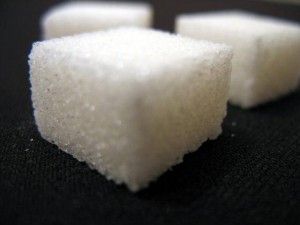Government Takes a Bead on Sugar
by Joseph Perkins | February 3, 2012 9:08 am
 [1]Feb. 3, 2012
[1]Feb. 3, 2012
Imagine driving home from a Super Bowl party and being stopped at a police checkpoint. You roll down your window and an officer asks what you’ve had to drink.
“Just a couple Red Bulls,” you reply. “I’m the designated driver.”
“Will you step out of the car please, sir,” the officer requests.
“Why?” you ask.
“Because,” he explains, “we’re going to measure your blood sugar level to make sure you’re not over the legal limit while operating a motor vehicle in the state of California.”
Sound farfetched? Well, maybe not so much. Not when you read the jeremiad[2], co-authored by researchers at UC San Francisco, published this week in the journal Nature, suggesting that sugar be considered a controlled substance — just like alcohol.
In their commentary piece, Robert Lustig, Laura Schmidt and Claire Brindis claim that sugar’s effects on the body can be similar to those of alcohol. As such, they argue, sale and use of the sweet stuff should be regulated by the government.
“When you think about it, this actually makes sense,” said Schmidt, in an appearance on CNN. “Alcohol, after all, is simply the distillation of sugar. Where does vodka come from? Sugar.”
Schmidt and her colleagues propose placing age restrictions on purchases of products with “added sugar” — which is defined as any sweetener containing the molecule fructose that is added to food in processing. They also suggest limiting sales of such products during school hours.
Sugar Tax
And, all-too-predictably, they advocate a sugar tax.
To bolster their case for designating sugar a controlled substance, the UCSF researchers cite the “landmark” book by social psychologist Thomas Babor, “Alcohol: No Ordinary Commodity: Research and Public Policy[3].”
In that 2003 book, Babor set forth four criteria that justify regulation of alcohol. Those criteria are now widely accepted by the public health community, according to Lustig, Schmidt and Brindis.
The criteria include: “unavoidability” (meaning pervasiveness throughout society), toxicity, potential for abuse and negative impact on society. Based on those criteria, the UCSF researchers insist, sugar is no less a threat to public health and safety than demon alcohol and, therefore, merits similar government oversight.
That conclusion will no doubt resonate in Sacramento, where tax-and-regulate Democrats will cite the Nature article as an inarguable “scientific” basis for imposing new taxes on foods and drinks containing fructose.
Just last year, in fact, the Legislature considered a measure that would have made California the first state in the nation to impose a soda tax. Fortunately, the proposed tax died in the Assembly. Had it become law, it would have cost the state’s soda-drinking residents nearly $2 billion a year.
Yet, scientific doubt remains as to whether fructose truly is as much a threat to public health as the UCSF researchers maintain.
Indeed, the Nature article noted that saturated fats were once blamed for the putative toxicity of high-processed foods, but that “most medical professionals no longer believe that fat is the primary culprit.”
Well, if the science was wrong on saturated fats, it could be just as wrong on fructose. That is why lawmakers at both the state and local levels should be wary of embracing the kind of public policy prescriptions proferred by the UCSF researchers.
— Joseph Perkins
- [Image]: http://www.calwatchdog.com/wp-content/uploads/2012/02/Sugar-cubes.jpg
- the jeremiad: http://healthland.time.com/2012/02/02/should-sugar-be-regulated-like-alcohol-and-tobacco/
- Alcohol: No Ordinary Commodity: Research and Public Policy: http://www.amazon.com/Alcohol-Ordinary-Commodity-Research-Public/dp/0199551146
Source URL: https://calwatchdog.com/2012/02/03/the-evils-of-sugar/